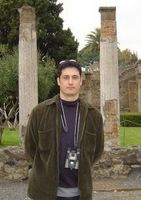Was Shakespeare Shakespeare or was he someone else?
I am fascinated and deeply in love with the works of William Shakespeare. His accomplishments are so many and so varied it is almost impossible to list them all. Primarily he changed and expanded the English language more than any writer before or after him, with Charles Dickens running second behind him. He also hastened the use of English as the official language of the realm and his additions influenced almost every change that followed him.
He also wrote group of works that crystallized, examined and put on display almost every variety and nuance of the human experience.
But did he actually write anything at all? Or was it his contemporary and sometimes collaborator Christopher Marlowe who actually wrote the entire canon on Shakespeare.
I had dinner on Monday night with an expert on the subject. A man who is currently writing a book that explores this possibility. The author is 100% convinced Marlowe was actually the author of all Shakespearean works. There have been a few books and documentaries covering the subject and the argument is fairly convincing and he is almost finished with what I think will be the definitive work on the subject.
Here are some of the points he made to me as I recall them.
-Dan prices 2001 book showed that all documents pertaining to Shakespeare's life show "he was an actor, a theatre shareholder, a businessman, a moneylender, a property holder, a litigant and a man with a family, but do not account for his presumed life as a professional writer." Not a single one.
-Shakespeare had practically no formal education and knew little of the government and court life.
-Marlowe was a child prodigy who started his career at age 8 by serving as a page to a nobleman until he was 15 when he entered the King's School in Canterbury. He underwent training in Latin, grammar, verse making and rhetoric. He wrote his first masterpieces while still in school and then went to Cambridge for six years where he mastered the classics.
-By the time Marlowe was 29 he had already written his translation of Ovid's Amores and the plays Dido: Queen of Carthage, Tamburlaine I and II, Doctor Faustus, Jew of Malta, The Massacre at Paris and Edward II.
-He was recruited into the secret service while at Cambridge. He became a skilled agent in the war between Protestants and Catholics (which was still new). He was the ultimate court and royal insider. Intrigue was his cocoon. Later, he made shocking statements about morals and religion along the way. He was considered so valuable as an agent that Lord Burghley, Elizabeth's head of the Secret Service, arranged for a fake murder to take place to save Marlowe from the torture and execution he was facing for his "outrages."
Marlowe then went into exile.
-He continued to write plays which were conveyed to Edward Blount, his executor, who arranged for William Shakespeare, part owner of the Globe theatre to deliver the plays to the company where no questions were asked of their provenance.
-In the plays and sonnets are a large number of clues that refer to Marlowe's life, friends and family, and not Shakespeare's.
In 1623 Edward Blount published the First Folio, which contained 36 plays attributed to Shakespeare but which may have been written by Marlowe.
So, the questions remain?
How could someone with no classical education write Julius Caesar? How could there not be a single document referring to Shakespeare and a written work? How could a man never exposed to court intrigue and royals nail them down so perfectly?
Maybe in the end it doesn't really matter. Just the idea of a Shakespeare, even if he is one person, two people, many people or no one at all, is enough. Its enough that the language, ideas and art expressed and the humanity examined through these masterpieces is the journey and the end.
But, as a minor scholar, historian and literary dreamer I am curious about the answers. I hope the book comes out soon.


